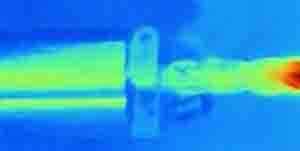Drilling is energy-intensive technological processes. Up to 90% of the energy, supplied to the tool, causes heat release. Remain is spent on residual changes in the tool and the destruction of material.
The drilling tool absorbs heat, its temperature rises, and it can lead to premature wear.
 Water, oil or other coolant are widely used to remove heat and lubricate the cutting edges of the drill bit. The lubrication reduces heat build-up, prolongs drill bit life and helps to avoid heat fractures in the material. Even minimal lubrication keeps the bit from burning up, but very good lubrication extends bit life by a factor of 5 or even 10.
Water, oil or other coolant are widely used to remove heat and lubricate the cutting edges of the drill bit. The lubrication reduces heat build-up, prolongs drill bit life and helps to avoid heat fractures in the material. Even minimal lubrication keeps the bit from burning up, but very good lubrication extends bit life by a factor of 5 or even 10.
Typically drill bit overheating is a consequence of a wrong feed and speed combination. If you don’t press the drill hard enough, the bit just spins without cutting. It overheats the bit and makes it dull. Too much pressure will also cause overheating, but it is difficult to achieve in hand drills. If your bit spins too quickly, it doesn’t bite enough material and overheats.
A type of the drill bit alloy defines heat resistance. HSS drill bits are made of a steel that has a higher heat resistance than high carbon steel. Carbide tipped drill bits have the ability to dissipate heat rapidly, and so will hold an edge longer and tolerate heat better than other drill bit options. Cobalt is less susceptible to heat damage than any other drill bit type, but it is also extremely brittle and prone to accidental damage.
However, overheating will destroy any drill. In high-speed steel (HSS) tools overheating causes loss of hardness. In carbide drills microcracks appear on the cutting edges and as a result they cause the drill to fail.
Drill bit coatings helps to deliver cutting fluid to the the drill bit and it makes the tool more heat resistant. Black Oxide provides a higher level of heat resistance and improved lubrication. Titanium nitride coating reduces friction during drilling and promotes heat dissipation. Titanium aluminum nitride is designed to increase the hardness and temperature resistance up to 800 degrees Celsius.
Overheating during sharpening became frequent with wide use of electric grinders. The tougher the steel, the bigger the problem is. HSS alloys are designed for work with high temperatures and if you are only sharpen the drill but not shaping it a lot, the risk of overheating is not so great. Usually you can spoil only thin drill bit when you try to quickly remove a lot of steel from it.
